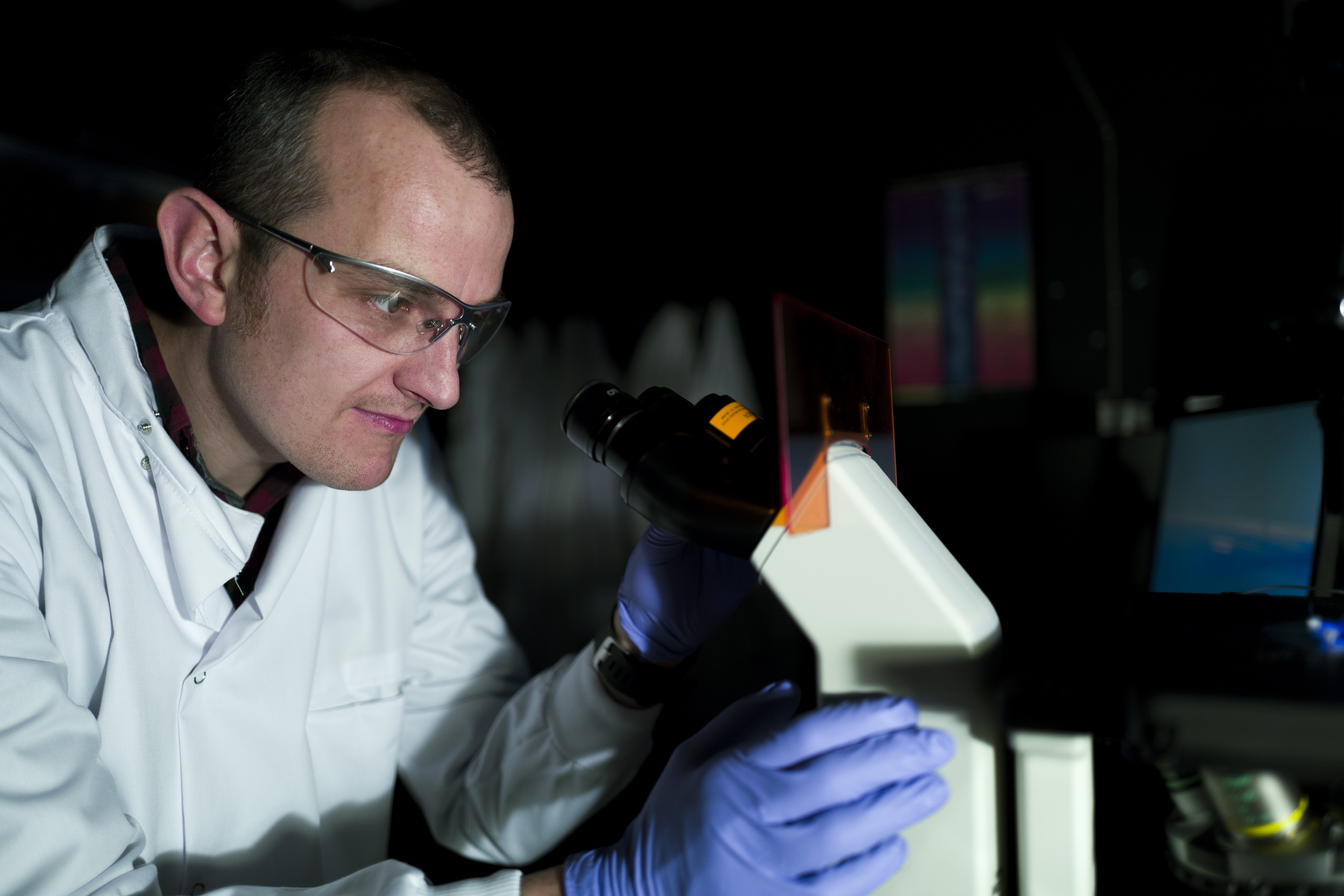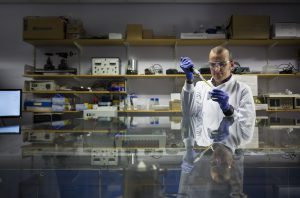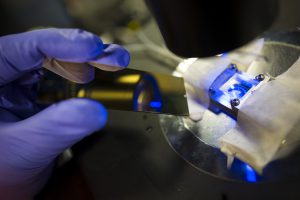
November 2, 2017, by Rob Ounsworth
£1m EPSRC award for researcher developing bioelectronics technology to transform healthcare
Dr Frankie Rawson, a Nottingham Senior Research Fellow in the School of Pharmacy, has won a prestigious grant of almost £1m from the Engineering and Physical Sciences Research Council (EPSRC) for his work in the emerging field of bioelectronics.
The £950,798 grant was awarded to further Dr Rawson’s research in developing new bioelectronic devices that will use electrochemical-based wireless technology to avoid invasive surgery, and can be applied to treating diseases such as cancer via the control of the body’s electrical signals.
EPSRC Chief Executive Professor Philip Nelson said: “EPSRC’s Healthcare Technologies Challenge Awards are designed to equip the next generation of research leaders with the tools they need to tackle current and emerging health challenges facing society.”
New era of therapeutic intervention
Dr Rawson said: “We are on the brink of a new era of therapeutic intervention that relies on modulating the body’s cellular electrical signals by merging biology with electronics, termed bioelectronic therapeutics or electroceutics. With strong support from the University of Nottingham I am leading an international multidisciplinary team, consisting of engineers, physicists, biologists, chemists and clinicians, to develop a new class of technology that stands to make an impact on human health and well-being.
“Nearly all research and development efforts in bioelectronic therapeutics are applied at modulating the central nervous system’s electrical signals to treat disease. This typically requires invasive surgery to implant an electrical device. Moreover, the current technology cannot adapt to patients’ bodies changing over time. “We will address these obstacles to using bioelectronics for the treatment of disease.
Wireless technology
“We will develop wireless technology to avoid invasive surgery. This would make bioelectronics therapeutics more accessible and adaptable to healthcare use. Leading biophysicist Professor Alex Noy of the Lawrence Livermore National Laboratory, USA; Dr Ruman Rahman, of the Medical School, University of Nottingham, and clinician Dr Stuart Smith of the Queens Medical Centre are leading this work.
“We will broaden bioelectronic therapeutics to non-neuronal cell types – bioelectronics currently focuses on modulating electrical signals in the central nervous system, yet all cells are electrically active.
“Working with Professor David Amabilino, of the School of Chemistry, and Lluisa Perez-Garcia in the School of Pharmacy we will develop nanotechnology to target electrical stimulus in the treatment of brain cancers.
“And in collaboration Professor Richard Hague, who heads the the Centre for Additive Manufacturing at Nottingham, Dr Michael McAlpine, a leading authority on 3D printing bioelectronics at the Department of Engineering, University of Minnesota, and Dr David Garrett, an expert in developing medical bionics devices, Department of Physics, University of Melbourne, we will be developing cutting edge 3D bioelectronics using additive manufacturing techniques. This will enable on-demand tailoring and manufacturing of bioelectronic therapeutics, and ease translation of our findings to medical applications as the technology develops in the future.
“I am extremely excited by this research and hope the fundamental science generated will lead to new improved avenues when developing electroceutic therapies.
International leader in research and development of new bioelectronics-based therapeutics
“The pathway to translation of the underlying science will be facilitated by Surescreen Diagnostics, which specialises in technology transfer into the NHS and has partnered with us on this research. Combining the world-leading strengths of the team will enable the University and me to maximise the impact of this new area by forging the UK’s place as an international leader in research and development of new bioelectronics-based therapeutics.”
Professor Clive Roberts, head of the School of Pharmacy at the University of Nottingham, said: “This EPSRC award is a major boost to the innovative research of Dr Frankie Rawson, in the emerging area of bioelectronics and the development of new electroceutical therapies.
“Frankie has been supported by a Leverhulme Fellowship and now a Nottingham Research Fellowship and I am especially glad to see how this support has led to this and other successes in his research. I look forward to the exciting future of this work and its longer-term exploitation for improved patient outcomes.”
The ESPRC’s £8m Healthcare Technologies Challenge Awards support to a new generation of research leaders to develop personal programmes of high quality, creative and multidisciplinary research, as well as supporting and growing their research groups.
No comments yet, fill out a comment to be the first



Leave a Reply